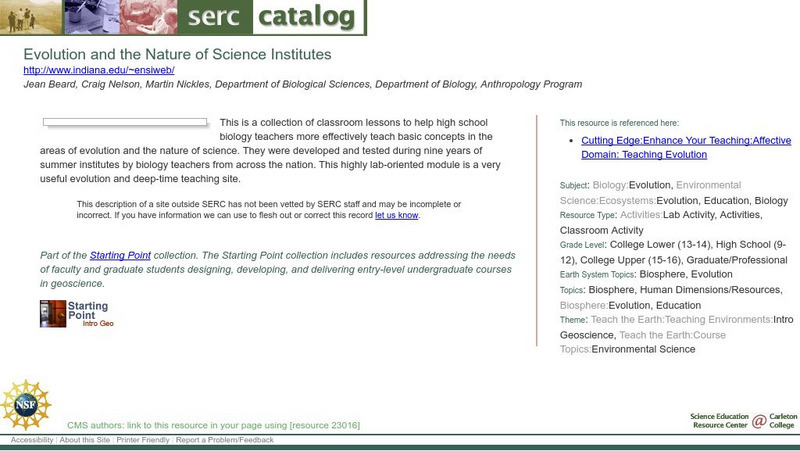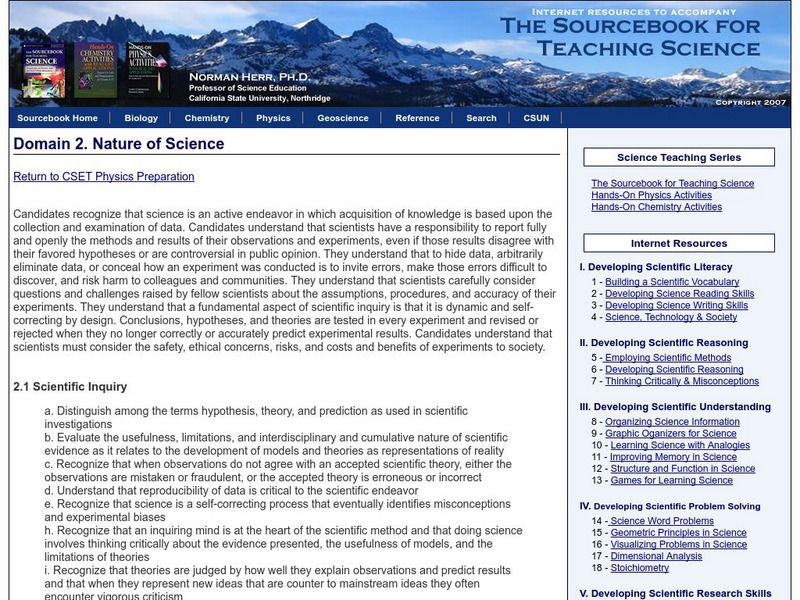Curated OER
What's Your Latitude?
Students measure the height of items using an astrolabe. In this latitude lesson students construct a sextant and determine height and latitude with it.
Curated OER
Measuring the Sun's Diameter
Learners project and measure the suns image using a refracting telescope. For this sun's diameter lesson students calculate the magnification of the telescope and determine the diameter if the Sun.
Curated OER
The Undiscovered Planet
Students find a planetary object using star fields. In this investigative lesson students determine the distance to an object using trigonometric parallax.
Curated OER
Spectroscopy Demonstrations
Students study light and see what emits photons and that light can be separated onto a spectrum. In this energy and matter lesson students identify gases using a spectrum chart.
Curated OER
Making Craters
Students study craters and identify the different things that characterize craters. In this crater lesson students create a model of an impact crater.
Curated OER
Cladistics Is a Zip...Baggie
Students explore how the grouping of organisms based on their shared derived characters forms the basis of a cladogram.
Curated OER
Why Do We Need Vitamin C in Our Diet?
Students compare/contrast the DNA sequence data of the rat GULO gene to the inactive human GULO gene. They translate and align the sequences, and propose a scenario to explain the occurrence of an inactive DNA sequence to that of an...
Curated OER
A Tree Full of Ancestors
Students study human evolution and the scientific process. They complete the Origins of Humankind Web activity to become familiar with the hominid species as well as the associated evidence found, in the form of fossils and artifacts.
Curated OER
Calculating the Average Mass of the Newly Discovered Element: Bean
Young scholars determine the average mass of a new element using masses from three isotopes. In this chemistry lesson, students explain what an isotope is. They discuss their importance and uses.
Curated OER
How Can You Study Things You Can’t See Like: Atoms?
Students simulate how scientists studied things they can't see like atoms. In this chemistry lesson plan, students predict what is inside the numbered obsertainers. They design a way to investigate what's inside without opening it.
University Corporation for Atmospheric Research
Ucar: The Nature of Science
This teaching box engages middle and high school students in the Nature of Science - what it is and what it isn't - along with activities to ensure engagement and enhance science understanding explicitly.
Other
Denver Museum of Nature & Science
This resource is the homepage of the Denver Museum of Nature & Science. Find out everything you'd want to know for planning a visit and see what exhibitions are currently showing.
University of California
University of California Museum of Paleontology: Nature of Science
A great beginner's guide to examining the nature of science. Covers the basics of how science helps us to understand the surrounding world.
Science Education Resource Center at Carleton College
Serc: Rutherford's Enlarged: A Content Embedded Activity on Nature of Science
Through a study of Ernest Rutherford's experiments with atomic structure, students develop a deeper understanding of the nature of science. The activity is taken from a linked article by the author that was published in the Journal of...
McGraw Hill
Glencoe Biology: The Nature of Science: Self Check Quiz
Answer five comprehension check questions about the nature of science in this interactive quiz.
University of California
Understanding Evolution: Nature of Science
Understand the processes behind the nature of science.
Science Education Resource Center at Carleton College
Serc: Evolution and the Nature of Science Institutes
A collection of classroom lessons to help high school biology teachers teach evolution and the nature of science. This highly lab-oriented module is a very useful evolution and deep-time teaching site.
Science Education Resource Center at Carleton College
Serc: Science as Storytelling for Teaching the Nature of Science
For this activity, young scholars first read an essay entitled Science As Storytelling, then respond to the questions accompanying it. The purpose of the lesson is for students to develop a deeper understanding of science as more than...
American Association for the Advancement of Science
Science for All Americans Online: The Nature of Science
A detailed overview of how scientists look at the world. Written in a way that the average person can understand, it opens up the world of science to everyone.
Georgia Department of Education
Ga Virtual Learning: Ap Biology: Nature of Science
In this online course, students look at the big ideas and themes of biology and review how these ideas are used to develop scientific inquiry and research.
Other
Denver Museum of Nature and Science: Follow a Fossil
Students examine paleontology, the study of ancient life on Earth. Some topics explored are vertebrates, invertebrates, and plants.
Other
Denver Museum of Nature and Science: What's the Weather Like Today? [Pdf]
Weather is all around us. We can see it, feel it, touch it, hear it, and even taste it. Weather is the condition of the atmosphere with respect to temperature, humidity, wind, and other factors. Some of the many weather conditions...
California State University
Csun: Nature of Science
This California State University Northridge essay on the "Nature of Science, the Scientific Method, and Measurement" includes a historical perspective.
CK-12 Foundation
Ck 12: Physical Science: Nature of Science
[Free Registration/Login may be required to access all resource tools.] Definition and goal of science and how science advances.
Other popular searches
- History and Nature of Science
- The Nature of Science
- Nature of Science Biology
- Nature of Science Inquiry
- Nature of Science Physics
- History Nature of Science
- Science Patterns in Nature
- Genetics Nature of Science
- Teaching Nature of Science
- Nature of Science Weather
- Genetic Nature of Science
- Science and Nature






















